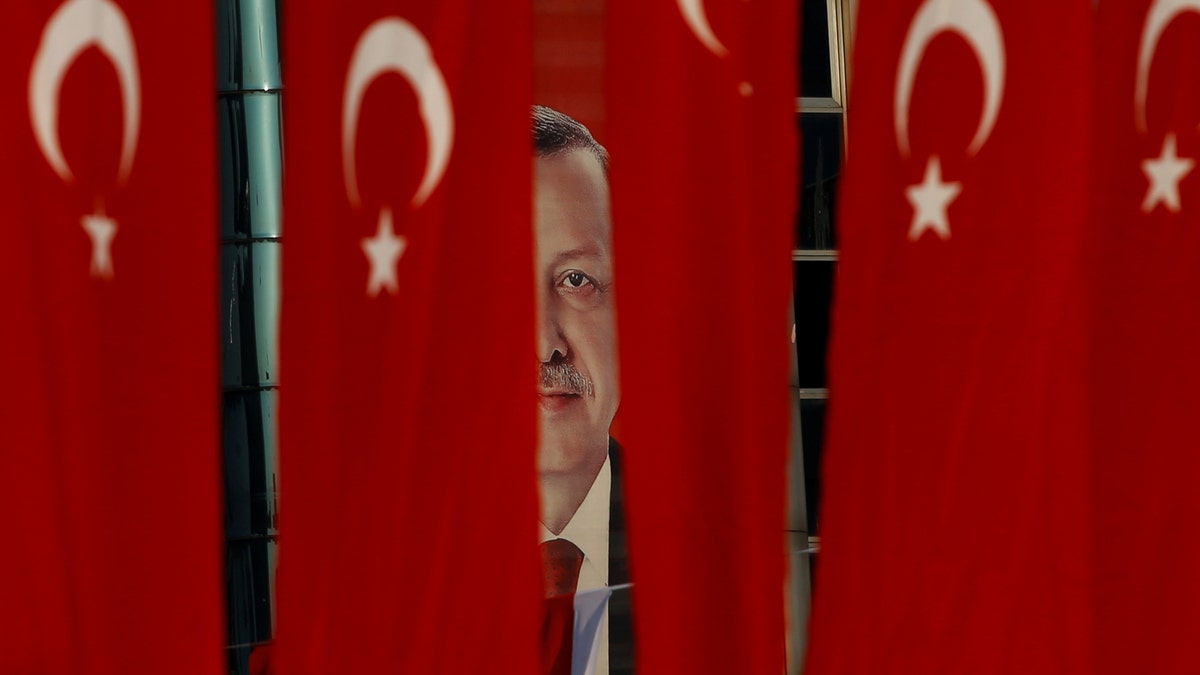
File photo - A picture of Turkish President Tayyip Erdogan is seen through Turkish national flags ahead of the constitutional referendum in Istanbul, Turkey, April 14, 2017. (REUTERS/Alkis Konstantinidis)
Turkey blocked access to Wikipedia, the free online encyclopedia, on Saturday, through a court measure used to block access to pages or entire websites to protect “national security and public order.”
The Information and Communication Technologies Authority (BTK) said an Ankara court ordered that a “protection measure” related to suspected Internet crimes be applied to Wikipedia, a collaborative online reference work.
In response, Wikipedia founder Jimmy Wales tweeted his support for those who labeled the decision censorship of social media: “Access to information is a fundamental human right. Turkish people I will always stand with you to fight for this right.”
Access to information is a fundamental human right. Turkish people, I will always stand with you and fight for this right. #turkey https://t.co/5ZAsc9coVX
— Jimmy Wales (@jimmy_wales) April 29, 2017
Turkey Blocks, an internet censorship monitor, said users in Turkey have been unable to access all language editions of Wikipedia since 8 a.m. local time Saturday.
Confirmed: All editions of the #Wikipedia online encyclopedia blocked in #Turkey as of 8:00AM local timehttps://t.co/ybFolRmsOs pic.twitter.com/hI9tn4bHe5
— Turkey Blocks (@TurkeyBlocks) April 29, 2017
“The loss of availability is consistent with internet filters used to censor content in the country,” the monitor said.
TURKEY BLOCKS POPULAR SOCIAL NETWORKS
Turkey’s official news agency, quoting the Ministry of Transport, Maritime Affairs and Communications, said Saturday the site was blocked for “becoming an information source acting with groups conducting a smear campaign against Turkey in the international arena.”
The state-run Anadolu Agency said officials had warned Wikipedia to remove content likening Turkey to terror groups but the site “persistently” did not.
Turkey had demanded that Wikipedia open an office in the country, act in line with international law and abide by court decisions and not be part of “blackout operation against Turkey,” according to the agency.
Anadolu said if these demands are met and the content removed, the site would be reopened.
HACKERS HIJACK TWITTER ACCOUNTS WITH SWASTIKAS, 'NAZI HOLLAND' MESSAGES
Turkey’s status is listed as “not free” on the 2016 Freedom on the Net index by independent rights watchdog Freedom House. It says over 111,000 websites were blocked as of May last year.
The country on Saturday also banned television dating programs. The decree banned radio and television programs for “finding friends and spouses” by adding a clause to the article on protecting children in Turkey’s media law. The shows will not be allowed to air without television content rating symbols.
Dating programs, which draw high ratings and large ad revenues, have been a hot topic this year. Petitions have called for their bans and lawmakers across the political spectrum have criticized the programs as having a negative influence on families. Government spokesman Numan Kurtulmus has described them as contrary to Turkish customs and religion.
The state of emergency that followed last summer’s coup attempt has allowed the Turkish government to rule by decrees. Since then, more than 47,000 people have been arrested and 100,000 have been purged for alleged connections to terror organizations.
The Associated Press contributed to this article.








































